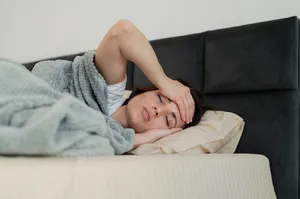Finally sleep well again: The best tips and routines for falling asleep
Theresa Hauser, MSc. | 20.03.2025

Many people regularly struggle with falling asleep. Tossing and turning at night instead of falling asleep affects quality of life and health. In this article, you'll find proven methods to improve your sleep and finally fall asleep well again.
Why is falling asleep sometimes so difficult?
Problems falling asleep often arise for various reasons. Stress and tension are often responsible, as they increase the release of stress hormones like cortisol, which keeps your mind awake. Additionally, worries and fears keep the mind active and delay falling asleep.
Poor habits can also contribute, such as late eating, alcohol, or caffeine in the evening. Screen time right before bedtime can also disrupt sleep, as the blue light from electronic devices inhibits the natural production of the sleep hormone melatonin, and we typically don't listen to relaxation exercises but instead engage in social networks. Other factors such as an uncomfortable mattress, disturbing noises, unpleasant room temperature, or a restless sleep environment also play a significant role.
Effective tips for falling asleep that really help
- Reduce screen time: Avoid screens at least half an hour before bedtime to promote melatonin production.
- Use relaxation techniques: Progressive muscle relaxation, breathing exercises, and meditation effectively reduce stress and prepare your mind optimally for sleep.
- Create an optimal sleep environment: Ensure complete darkness, quiet, and a comfortable temperature (ideally around 18°C).
- Regular sleep rhythm: Try to go to bed and wake up at the same time every day to regulate your internal clock.
- Avoid alcohol and caffeine in the evening: These substances negatively affect your sleep, and caffeine can directly make falling asleep more difficult.
- Light exercise in the evening: Gentle stretching exercises or a short walk help to reduce physical tension.
- Keep a journal: Write down burdensome thoughts before going to bed to calm your mind.
Establish a relaxing evening routine
A good evening routine clearly signals to your body that it's time to wind down:
- Warm shower or bath: The warmth relaxes your muscles and promotes falling asleep.
- Relaxing activities: Read a book, listen to calm music, or practice gentle yoga exercises.
- Drink calming herbal teas: Herbal teas with valerian, lemon balm, or lavender can promote relaxation and improve your sleep quality.
sleep² helps you fall asleep faster
With the sleep² app, you can easily integrate these effective tips for falling asleep into your daily routine:
- Personal sleep analysis: Identify specifically which habits hinder your falling and staying asleep.
- Individual recommendations: Receive strategies tailored to you to optimally adjust your evening routine and sleep environment.
- Sleep tracking & progress tracking: Monitor your progress and continuously adjust your routines.
More Articles

Is it possible to live permanently with 4–5 hours of sleep? – The science behind short sleepers
07.11.2025

Chronic Sleep Disorders: When You Need to Act and What Really Helps
22.04.2025

Sleep Quality Instead of Quantity: Why You Are Tired Despite 7 Hours of Sleep
06.11.2025


